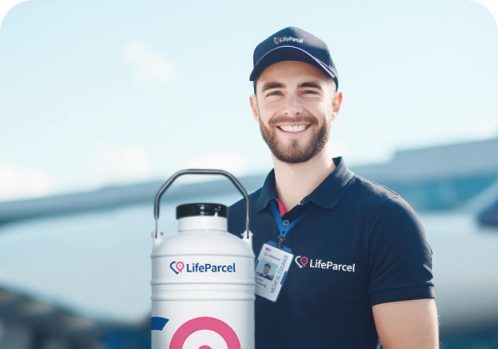If you’re facing the prospect of shipping your embryos, eggs, or sperm, you’re likely feeling a similar mix of hope and anxiety. The good news? Thousands of families successfully transport their genetic material every year. The key is knowing what you’re getting into and how to do it safely.
The reality check: this isn’t regular shipping
It goes without saying that shipping IVF material safely is nothing like sending a package. You’re dealing with:
- Irreplaceable genetic material that represents years of treatments and tens of thousands of dollars
- Cryogenic temperatures colder than space that must never fluctuate
- International regulations that can shut down shipments if paperwork isn’t perfect
- Time-sensitive delivery where delays can mean canceled treatment cycles
Understanding these realities upfront helps you make informed decisions rather than hoping everything works out.
Start planning 4-6 weeks before you need your precious cargo
This is not a last-minute decision. Here’s your timeline:
6 weeks before:
- Research transport options and get quotes
- Contact both your current and destination clinics
- Begin gathering required documentation
4 weeks before:
- Finalize your transport provider
- Submit all paperwork for permits (international shipments)
- Coordinate clinic schedules
2 weeks before:
- Confirm all arrangements with clinics and courier
- Double-check documentation and permits
- Plan backup timing in case of delays
1 week before:
- Final confirmation of pickup and delivery details
- Prepare for travel if you’re accompanying the shipment
Why so much lead time? International permits can take weeks to process, clinics need advance notice to prepare your materials, and customs paperwork must be flawless. Rushing this process is where things go wrong.
The documentation maze: what you actually need
Getting your paperwork wrong can strand your embryos at customs or cause clinic rejections. Here’s what you need:
For all shipments:
- Signed consent forms from both clinics
- Medical necessity letters
- Patient identification and treatment records
- Chain of custody documentation
- Insurance coverage verification
For international shipments:
- Import/export permits (requirements vary by country)
- Customs declarations stating “personal medical use”
- Health authority approvals (some countries require this)
- Notarized translations if documents aren’t in local language
Pro tip: Different countries have wildly different requirements. Spain might need permits that Canada doesn’t, while Australia has completely different documentation standards. Do research well in advance to make sure you have ample time to get all the required documentation.
How to evaluate IVF transport providers
If that timeline and documentation list feels overwhelming, you’re not alone—many families decide to work with a professional transport company who takes it all off their shoulders. But how do you know which one will actually know how to ship your IVF material safely? Here’s how to identify providers with real expertise.
Questions that reveal true expertise:
“Walk me through your worst-case scenario protocols.”
- Good answer: Specific backup plans, emergency storage partners, alternative routing options
- Red flag: Vague assurances that “nothing goes wrong”
“Can I speak with a family who recently used your service?”
- Good answer: References available (with permission)
- Red flag: “We can’t share client information” without offering alternatives
“What happens if customs holds my shipment over the weekend?”
- Good answer: 24/7 support, relationships with customs brokers, emergency protocols
- Red flag: “We’ll handle it on Monday”
“Show me temperature logs from a recent international shipment.”
- Good answer: Real data showing consistent -196°C temperatures
- Red flag: Generic charts or reluctance to share actual logs

Typical pricing:
- Domestic US transport: $1,500-$4,000
- International transport: $3,000-$8,000+
- Express/emergency service: 50-100% premium
If someone quotes you significantly below these ranges, ask why. There’s usually a reason—and it’s rarely good.
Red flags: when to walk away
Avoid providers who:
- Can’t show you real-time monitoring capabilities
- Refuse to provide references or track records
- Offer prices significantly below market rates
- Can’t explain their specific protocols for your destination country
- Don’t have 24/7 support for international shipments
- Use multiple handoffs instead of dedicated couriers
Making the decision: DIY vs. professional transport
After learning what’s involved, you might be wondering whether to handle the transport yourself or hire professionals. Both options can work, but success depends on honestly assessing your situation and comfort level.
Consider self-transport if:
- You’re comfortable navigating international customs
- You understand cryogenic handling requirements
- You’re prepared for 24/7 responsibility during transport
Use professional services if:
- You’re shipping internationally with complex requirements
- You want insurance coverage and liability protection
- You prefer to focus on your treatment rather than logistics
How to ship IVF material safely: the bottom line
Safe embryo transport comes down to three things:
- Planning ahead with realistic timelines
- Choosing experienced providers with proven track records
- Understanding the risks and having backup plans
Your precious cargo represents hope, time, money, and dreams. They deserve transport that treats them with the same care you’d want for your future child.
At LifeParcel, we’ve helped over 2,500 families navigate this journey successfully. Our embryologist-owned company understands both the science and the emotions involved. When you’re ready to learn how to ship embryos safely, we’re here to guide you through every step.
Want to take the stress out of IVF material transport? Request a quote or call us at +1-866-370-6577.





